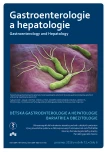Impact of anti-TNFα exposure in utero on the development of immune systems of exposed children – a controlled, multicentre observational study
Authors:
Ďuricová D. 1; Dvořáková E. 1; Hradský O. 2; Mitrová K. 1,2; Durilová M. 3; Koželuhová J. 4; Kohout P. 5; Zárubová K. 2; Bronský J. 2; Hradská N. 6; Bronská E. 7; Adamcová M. 7; Machková N. 1; Hrubá V. 1; Bortlík M. 1,8,9; Lukáš M. 1; Malíčková K. 1,10
Authors‘ workplace:
Klinické a výzkumné centrum pro střevní záněty ISCARE I. V. F., a. s., Praha
1; Pediatrická klinika 2. LF UK a FN Motol, Praha
2; Klinika dětské chirurgie 2. LF UK a FN Motol, Praha
3; Gastroenterologické a hepatologické oddělení, I. interní klinika LF UK a FN v Plzni
4; Interní klinika 3. LF UK a Thomayerovy nemocnice, Praha6 Privátní ordinace PLDD, Litovel
5; Privátní ordinace PLDD, Praha
7; Interní klinika 1. LF UK a ÚVN, Praha
8; Farmakologický ústav 1. LF UK a VFN, Praha
9; Ústav lékařské biochemie a laboratorní diagnostiky, 1. LF UK a VFN, Praha
10
Published in:
Gastroent Hepatol 2018; 72(6): 479-485
Category:
doi:
https://doi.org/10.14735/amgh2018479
Overview
Background:
Data on safety of in utero exposure to anti-tumor necrosis factor (TNF) α on long-term childhood development are sparse. Our aim was to assess the impact of in utero exposure to anti-TNFα on the postnatal development of immune systems of exposed children.
Methods:
Children (≥ 12 months of age) born to mothers with inflammatory bowel disease (IBD) (2007–2016) treated with anti-TNFα during pregnancy in three centres were included. Unexposed children of non-IBD mothers who came for mandatory check-up to the general pediatrician served as a control group. A predefined questionnaire was distributed by the pediatricians to collect data on the perinatal period, infectious complications, antibiotic use, and vaccination.
Results:
We included 72 exposed and 69 unexposed children (median age 35 months and 50 months, respectively). No significant difference in infectious complications ≤ 1st year of life (23.9 vs. 17.4%, p = 0.36) or during the whole follow-up (p = 0.32) was found between exposed infants and controls. Concomitant immunosuppressive therapy during pregnancy and anti-TNFα levels in cord blood did not increase the infection rate ≤ 1st year of life (p > 0.05). Protective titers of antibodies to vaccination were found in > 95% of exposed children except for H. influenzae and mumps vaccines. However, these two vaccines had the lowest serologic response in the control group, too.
Conclusions:
Treatment with anti-TNFα during pregnancy seemed to be safe with regard to postnatal development of the immune systems of exposed children.
Key words: inflammatory bowel disease – anti-TNFα – gravidity – infections – vaccination
Submitted: 22. 11. 2018
Accepted: 28. 11. 2018
Sources
1. Burisch J, Munkholm P. The epidemiology of inflammatory bowel disease. Scand J Gastroenterol 2015; 50(8): 942– 951. doi: 10.3109/ 00365521.2015.1014407.
2. van der Woude CJ, Ardizzone S, Bengtson MBet al. The second European evidenced-based consensus on reproduction and pregnancy in inflammatory bowel disease. J Crohns Colitis 2015; 9(2): 107– 124. doi: 10.1093/ ecco-jcc/ jju006.
3. Julsgaard M, Christensen LA, Gibson PR et al. Concentrations of adalimumab and infliximab in mothers and newborns, and effects on infection. Gastroenterol 2016; 151(1): 110– 119. doi: 10.1053/ j.gastro.2016.04.002.
4. Bortlik M, Duricova D, Machkova N et al. Impact of anti-tumor necrosis factor alpha antibodies administered to pregnant women with inflammatory bowel disease on long-term outcome of exposed children. Inflamm Bowel Dis 2014; 20(3): 495– 501. doi: 10.1097/ 01.MIB.0000440984.86659.4f.
5. de Lima A, Zelinkova Z, van der Ent C et al. Tailored anti-TNF therapy during pregnancy in patients with IBD: maternal and fetal safety. Gut 2016; 65(8): 1261– 1268. doi: 10.1136/ gutjnl-2015-309321.
6. Chaparro M, Verreth A, Lobaton T et al. Long-term safety of in utero exposure to anti-tnfα drugs for the treatment of inflammatory bowel disease: results from the multicenter European TEDDY Study. Am J Gastroenterol 2018; 113(3): 396– 403. doi: 10.1038/ ajg.2017.501.
7. Mahadevan U, Martin CF, Sandler RS et al. PIANO: A 1000 patient prospective registry of pregnancy outcomes in women with IBD exposed to immunomodulators and biologic thera-py (Abstract 865). Gastroenterol 2012; 142 (5 Suppl 1): S149.
8. Kanis SL, de Lima-Karagiannis, van der Ent C et al. Anti-TNF levels in cord blood at birth are associated with anti-TNF type. J Crohns Colitis 2018; 12(8): 939– 947. doi: 10.1093/ ecco-jcc/ jjy058.
9. Mahadevan U, Martin CF, Kane SV et al. Do infant serum levels of biologic agents at birth correlate with risk of adverse outcomes? Results from the PIANO Registry. Gastroenterol 2016; 150 (4 Suppl 1): S91– S92.
10. Zinke M, Disselhoff J, Gartner B et al. Immunological persistence in 4– 6 and 7– 9 year olds previously vaccinated in infancy with hexavalent DTPa-HBV-IPV/ Hib. Hum Vaccin 2010; 6(2): 189– 193.
11. Beaulieu DB, Ananthakrishnan AN, Martin C et al. Use of biologic therapy by pregnant women with inflammatory bowel disease does not affect infant response to vaccines. Clin Gastroenterol Hepatol 2018; 16(1): 99– 105. doi: 10.1016/ j.cgh.2017.08.041.
Labels
Paediatric gastroenterology Gastroenterology and hepatology SurgeryArticle was published in
Gastroenterology and Hepatology

2018 Issue 6
- Metamizole at a Glance and in Practice – Effective Non-Opioid Analgesic for All Ages
- Metamizole vs. Tramadol in Postoperative Analgesia
- The Importance of Limosilactobacillus reuteri in Administration to Diabetics with Gingivitis
- Safety and Tolerance of Metamizole in Postoperative Analgesia in Children
Most read in this issue
- Meckel’s diverticulum as a cause of abdominal emergency
- Hepatopathy as the first manifestation of systemic AL amyloidosis
- Wilson’s disease in childhood – two case reports
- News of pharmacological treatment of obesity
